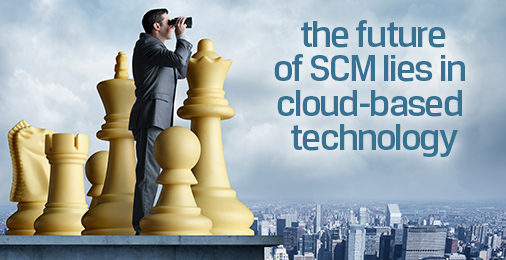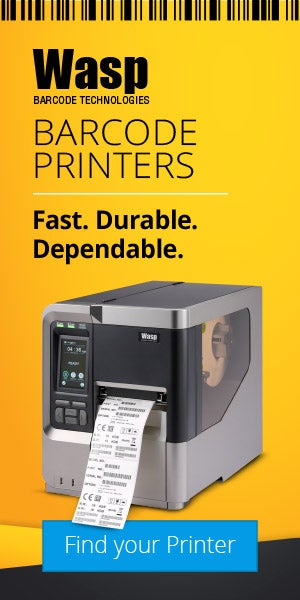Wasp Barcode Technologies: The Barcode Solution People
What is Supply Chain Management?

In an increasingly globalized world, there may be no greater asset to a company’s bottom line than a well-managed supply chain.
Dell Computers once said that their supply chain is “the biggest leverage point we have,” and many of the planet’s leading companies are finding a correlation between the sophistication of their supply chain and financial success. From intercontinental corporations to small firms, every business utilizes a supply chain to turn customer demand into a delivered product.
Because supply chain management (SCM) involves overseeing so many different industries and processes, some
systems or steps can be underserved or unnoticed altogether -- which is why understanding what
SCM does for your business is so crucial.
[su_divider top="no" size="2"]
The supply chain encompasses all parties involved with moving a product or service to a customer.
[su_divider top="no" size="2"]
What is the supply chain?
The
supply chain encompasses all parties involved with moving a product or service to a customer. Most supply chains include companies manufacturing parts for the product, assembling it, delivering and selling the product. Thus, the supply chain process generally begins with an order and ends when the customer has received their desired product or service.
Not every business has the same supply chain -- different business models call for different links in the chain, and different steps are taken to complete a customer’s order. For example, manufacturers can sometimes fulfill an order to a customer directly; others need physical retail space to display their products before customers feel comfortable purchasing them.
Thus, supply chain management is a different process for each company -- especially when comparing global corporations to small family-owned businesses.
What is supply chain management and why is it important?
According to Investopedia.com, Supply Chain Management (SCM) is the streamlining of a business’ supply-side activities to maximize customer value and to gain a competitive advantage in the marketplace. The process begins with an order for raw materials and ends when the customer receives their desired item. Maintaining accurate records of inventory and their placement throughout the process is the key to
efficiently managing a supply chain while gaining an advantage over the competition.
The desired result for SCM is to create a streamlined process which turns the demand for a product into the customers receiving their desired product quickly -- because without happy customers, there is no business.
[su_divider top="no" size="2"]
[su_divider top="no" size="2"]
What are the benefits of effective supply chain management?
Well-run supply chains help businesses outperform their less-organized competitors.
Bain & Company conducted a study that showed companies with a sophisticated supply chain and quality management methods enjoyed 12 times greater profit than those with unsophisticated methods.
We can attribute the greater profits of companies with managed supply chains to several factors:
- Optimized inventory -- Inventory management is a major aspect of SCM: Without accurate accounting as to how much inventory a company has, where it’s located and where it needs to go, most companies experience an imbalanced inventory turnover ratio, which leads to either overstocking or the inability to meet demand. (bad link, so I removed it) Thus, the ultimate goal of optimized inventory is having no more inventory than what is absolutely necessary to meet customer service and revenue goals.
- Increased responsiveness and adaptability -- Visibility into the workings of the supply chain makes it easier to respond quickly to changes in the market or to a customer’s demands.
- Well-monitored efficiency and compliance -- Good SCM will show businesses where inefficiencies in their model lie and how best to correct them. Additionally, compliance in terms of environmental issues (an increasingly important issue to consumers), health and safety can also be tracked and assessed.
- Effective Big Data mining -- Evaluating data gleaned from customers is how businesses stay competitive. Knowing how to acquire, analyze and enact changes based on Big Data allows businesses to modify strategies and procedures to better serve customers going forward.
Emerging supply chain trends also show how SCM will help businesses become better connected to their suppliers, manufacturers and consumers. Cloud-based analytics, real-time tracking and on-demand procurement are just some of the ways that improving technology will be integrated into the supply chain management process.
What forms do supply chain management take?
In years past, supply chain management could mean as little as planning and scheduling deliveries and ensuring space in warehouses. More recently, supply chain management software has become the standard-bearer across many industries -- this type of software usually covers things like
inventory management, supplier management or sourcing, purchase order processing and forecasting.

In the years to come, it’s clear that the future of SCM lies in cloud-based technology. Already
a multi-billion dollar industry, global supply chain management software’s shift into the cloud will allow all partners involved to access the same logistics and information -- thus making the transfer of goods from one end of the chain to the other even more efficient.
The innovations in SCM have reshaped the strategies behind transporting products to customers today. As Dell discovered the direct link between financial success and an efficient supply chain, many large businesses are beginning to adopt the same strategies in their SCM. The end result of a strong supply chain will be increased customer satisfaction, becoming a cycle of continued financial success.
Think your business would benefit from improving your supply chain? Click here to schedule a live, one-on-one demo today, or call 888-648-4452.




